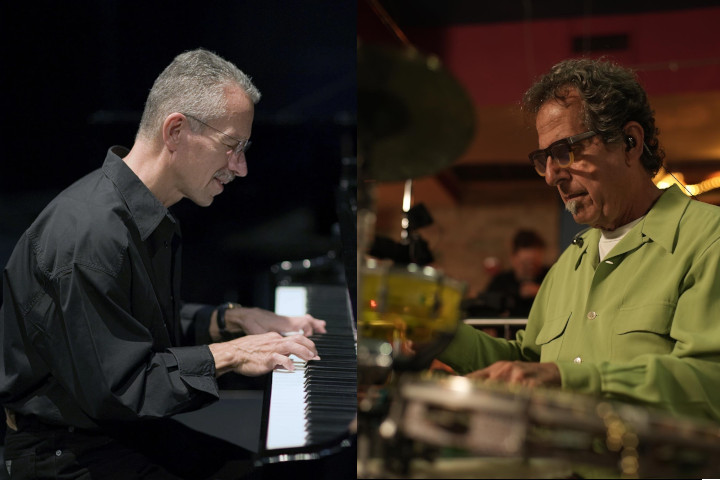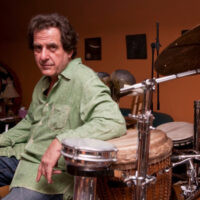
Sometime in the mid-70s, percussionist Jamey Haddad was in a studio in Beachwood for a session that concluded a bit early, so he asked engineer Dale Peters (yup, the James Gang’s bassist) to keep the tape rolling while he played drums along with a record that he was particularly taken with. That record was The Köln Concert, the 1975 ECM double album that became bestselling piano album and solo recording in jazz history, and arguably vaulted its creator, Keith Jarrett, to jazz stardom.
Two generations later, Haddad has lost none of his love for Jarrett’s music and this weekend he will play it with a quartet of guitarist Jonah Ferguson, bassist Kip Reed and saxophonist Bobby Selvaggio at four venues in Northeast Ohio and Pittsburgh.
The big-eared Haddad had been checking out Jarrett long before the pianist’s mid-70s success. Charles Lloyd’s Forest Flower, (Atlantic, 1967) and Buttercorn Lady, a session by an oddball edition of Art Blakey’s Jazz Messengers that featured Chuck Mangione on trumpet, were early encounters. “Then it was Life Between the Exit Signs (Atlantic, 1968) and The Mourning Of A Star (Atlantic, 1971),” Haddad said by phone from Boston where he was participating in Yo Yo Ma’s Silk Road Global Workshop.
 “Then there’s the quartets. We always had an interesting relationship with that,” Haddad said. “I mean, we loved that music. My old crowd really liked that music. That band gave us permission to feel, to be fans of the jazz tradition and . . . all the different aspects: funky or loose, an almost rock and roll-ish kind of gospel.” That music, he said, “brought in more of the things that were native to my musical diaspora in a way.”
“Then there’s the quartets. We always had an interesting relationship with that,” Haddad said. “I mean, we loved that music. My old crowd really liked that music. That band gave us permission to feel, to be fans of the jazz tradition and . . . all the different aspects: funky or loose, an almost rock and roll-ish kind of gospel.” That music, he said, “brought in more of the things that were native to my musical diaspora in a way.”
Jarrett’s career as an ensemble pianist, as distinct from his solo concerts and occasional forays into European concert music, can be divided into roughly three phases: the early sideman work with Charles Lloyd and Miles Davis, the long-running piano trio with Jack DeJohnette and the late Gary Peacock, and the quartets with saxophones that he led with quartets of American and European musicians.
Given the musicians Haddad has chosen, the music of those latter groups will fill the as-yet undetermined setlists. What’s certain is that with four gigs booked, Haddad can assemble a big book of tunes from which to choose.
“We’ll do ‘Spiral Dance’ and ‘The Windup’ from European [Quartet] and ‘Questar,’ too. And we’ll do ‘Southern Smiles’ from the American Quartet,” he said. “They’re pretty straight-ahead songs. These tunes are specific and a lot of them have very specific harmony that makes them what they are. So, maybe some feels, of course, would have to be different. There’s just no way they could be the same.”
That goes for Haddad’s playing behind the kit, which in this material brings him face-to-face with the legacy of Jarrett’s longtime drummer Paul Motian. Though Motian’s style bears little resemblance to Haddad’s—or any other drummer’s for that matter, the respect runs deep. “I grew up knowing him from Bill Evans’ trio, and if you listen to really early recordings of him, he had more be bop-ish kind of chops, a young guy who had respect for the tradition,” Haddad said. ”The more you know about his own energy and what causes propulsion, the more you understand how he develops a style of propelling music with sound and color.”
Sound and color, propulsion and swing: these have been Jamey Haddad’s calling cards for 50 years.
Jamey Haddad Quartet Plays the Music of Keith Jarrett Thursday, August 17, The Treelawn Social Club, 15335 Waterloo Rd. Cleveland, $15 (advance) ,$20 (door) available here. Saturday, August 19, 8 p.m. at BOP STOP, 2920 Detroit Ave. $20 available here. Sunday, Aug. 20, 8 p.m. at BLU Jazz+, 47 E. Market St. Akron $20 available here.
